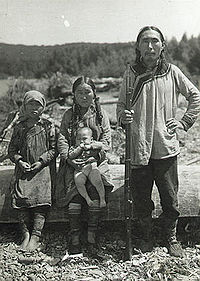Udege_people
Udege people
Indigenous group in Russian Far East
Udege (Russian: Удэгейцы; Udihe: удиэ or удиһе, or Udihe, Udekhe, and Udeghe correspondingly) are a native people of the Primorsky Krai and Khabarovsk Krai regions in Russia. They live along the tributaries of the Ussuri, Amur, Khungari, and Anyuy Rivers. The Udege speak the Udege language, which belongs to the Tungusic language family. Their religious beliefs include animism, animal worship, and shamanism. The Udege are mainly engaged in hunting, fishing, and ginseng harvesting. According to the 2002 census, there were 1,657 Udege in Russia, a slight increase from 1,500 in 1970. This was down to 1,496 Udege in Russia in the 2010 census. They are one of the closest ethnic groups to the Manchu and Nanai, and are possibly of Xi Yeren Jurchen origin.
You can help expand this article with text translated from the corresponding article in Ukrainian. (July 2011) Click [show] for important translation instructions.
|
You can help expand this article with text translated from the corresponding article in Russian. (February 2024) Click [show] for important translation instructions.
|
The largest settlements of Udege are in:
- Khabarovsk krai: Gvasiugi (Imeni Lazo District) and Arsenievo (Nanaysky District)
- Primorsky krai: Agzu (Terneysky District), Krasny Yar and Olon (Pozharsky District)
Since the advent of Perestroika, the Udege, led by Pavel Sulyandziga, have been actively involved in the struggle for control over their traditional territories along the Bikin River. A central objective has been the establishment of a Territory of Traditional Natural Resource Use of federal status, which was proposed in cooperation with the national umbrella organisation RAIPON and the Russian Institute of Anthropology and Ethnography but failed to be approved by the authorities.[3]
According to the 2001 Ukrainian census, out of 40 Udeges living in Ukraine, only 8 declared Udege as their native language. Most of the Udeges in Ukraine indicated Russian (19) or Ukrainian (6) as their native language. 7 of them named another language.[2]
